After Chauri Chaura, Gandhi withdrew the Non-Cooperation Movement.
The Nehrus were furious....
Zaheer Ali reveals what happened during one of the most momentous events in India's freedom movement.
An exclusive extract from his book, Khilafat In History And Indian Politics.
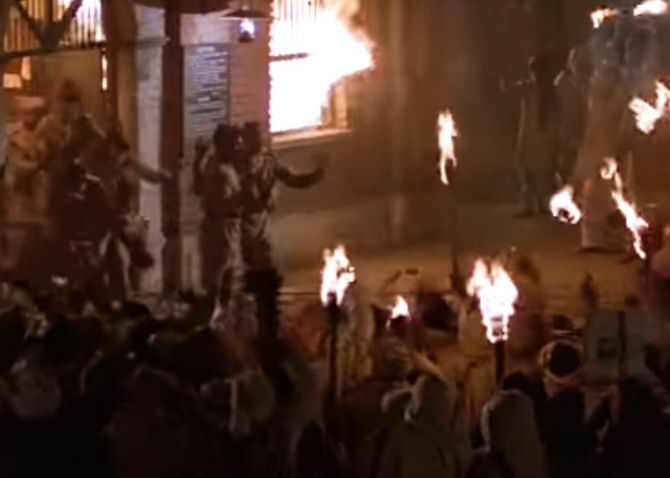
Chauri Chaura witnessed a large protest on February 5, 1922 as part of the Non-Cooperation Movement.
The demonstration actually started a day before when about 2,500 people picketed a liquor shop.
The police arrested one of the leaders. The people were infuriated and gathered before the police chowki, demanding the release of their leader.
Armed police arrived and fired at the slogan-shouting protesters. Three people were killed on the spot and many more were injured.
This exacerbated the situation as the infuriated protesters irately advanced towards the policemen without bothering about their guns.
This astonishing display of courage by the protesters intimidated the policemen and they sought protection in the chowki.
The incensed crowd set the chowki on fire, burning alive 23 Indian policemen.
The Chauri Chaura incident horrified Gandhi so much that he thought of it as his personal complicity in the bloodshed.
As penance for the guilt he suffered, he went on a five day fast.
He mulled over the point that he had failed in training his satyagrahis properly in the method of non-violent agitation.
He also felt that Indians were not fully prepared to carry out a peaceful agitation against the British Raj.
He therefore declared, on February 12, against the opinion of many of his Congress colleagues, the end of the Non-Cooperation Movement.
That did not deter the authorities from arresting him. He was sentenced to six years imprisonment, but he was released on health grounds in February 1924.
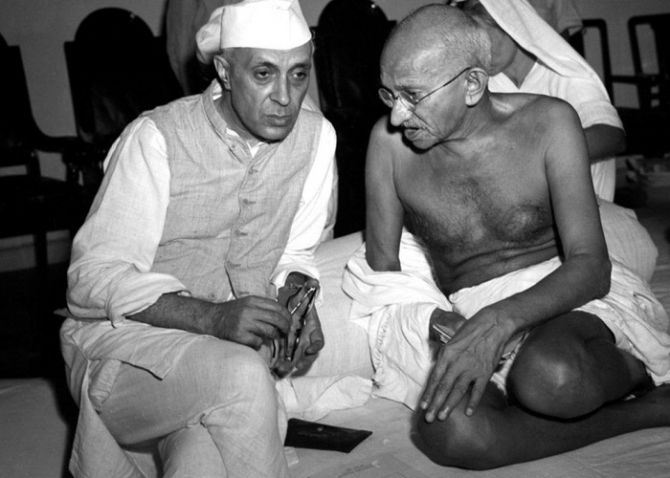
The end of the Non-Cooperation movement weakened the Khilafat Movement to a great extent.
The leaders of both the Congress and the Khilafat were dismayed by Gandhi's decision.
For them, it was admission of defeat and a betrayal of the lakhs of Indians who had sacrificed almost everything to support the twin movements of Khilafat and Non-Cooperation.
C Rajagopalachari, who was considered to be very close to Gandhi, wrote in his diary: '...Despite my close relationship with my mentor Gandhi, I fail to understand the reason why he called off the movement.'
Mohammad Ali (Jouhar, a leading figure of the Khilafat Movement) was in jail. He was completely distraught on learning about it (Gandhi's decision).
The Kanpur Khilafat Committee, at the prompting of Hasrat Mohani and Maulana Azad Subhani, declared it would oppose Gandhi's decision.
The Jamiat-ul-Ulama too expressed its reservation about the principle of absolute non-violence in its Ajmer session held in early March 1922.
Chaudhary Khaliquzzaman, an important leader of the Khilafat movement, said when the Nehrus, Motilal and Jawaharlal, learned about the calling off of the movement in Lucknow jail, they were extremely offended.
In his words: 'Pandit Motilal was furious... and expressed his deep resentment and anger at what had happened... He... shouted, "Look here what has happened... This ends the movement because some people in a big country like India have lost their mind and committed violence".'
'Jawaharlal... did not say anything at that time. However, I could see by his face that he did not like it and shared his father's views.'
Maulana Abdul Bari was beside himself and, in the heat of the moment, said: 'To me Gandhiji is like a paralytic whose limbs are not in his control, but whose mind is still active. I am doubtful of his (future) success because he has not yet acquired much success from his (non-violent) movement...There is general depression all over.'
When Gandhi learnt about Maulana Bari's annoyance, he rushed to Ajmer, where Bari had made the statement and did his best to mollify the maulana who, in turn, issued a conciliatory statement: 'I had agreed with Gandhiji that, until I had become hopeless of the success of the non-violent Non-Cooperation Movement, I would not do anything against it openly or secretly.'
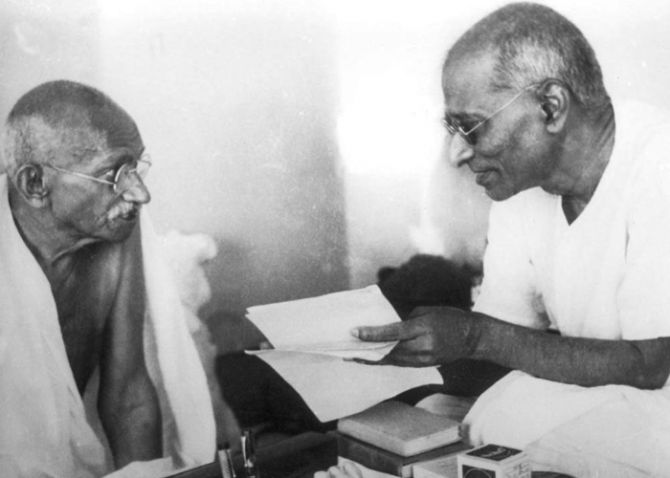
Gandhi's decision to call off the movement had a huge adverse impact on the Khilafat volunteers.
The widespread reaction among them was that they were cheated.
On the other hand, the authorities were very happy.
Harcourt Butler, the governor of UP, had remarked that Hindu-Muslim unity was on the verge of death.
With the intention of intensifying the hatred between Hindus and Muslims, the viceroy sent a telegram to London pleading with the British government to reconsider the terms of the Treaty of Sevres.
It was a clever ploy to wean the Muslims away from the mainstream nationalist movement.
Sadly, many leaders of the Khilafat movement were caught in the trap.
Then, at the prompting of the British Raj, The Statesman of Calcutta published the news that there was misappropriation from the Khilafat fund. This greatly damaged the reputation of the Khilafat leaders.
Then came news from Turkey that Kemal Pasha had brought in radical reforms which had made the future of the institution of the Khilafat uncertain.
The first swipe at the Khilafat was taken by Turkey's grand national assembly in November 1922, when the sultan, Wahiduddin Muhammad VI, was deposed and Abdul Majid Effendi was nominated the new caliph.
The separation of the temporal powers from the spiritual office of the caliph rendered the Khilafat movement of the Indian Muslims inconsequential.
Many ulema (the body of Muslim scholars with specialised knowledge of Muslim law and theology) in India were dismayed on receiving the news because, in their view, the separation of temporal powers from the spiritual was against Islam.
Nonetheless, for some ulema it was an agreeable development as they thought the institution of Khilafat got back its sanctity after its separation from the hereditary position of the sultan.
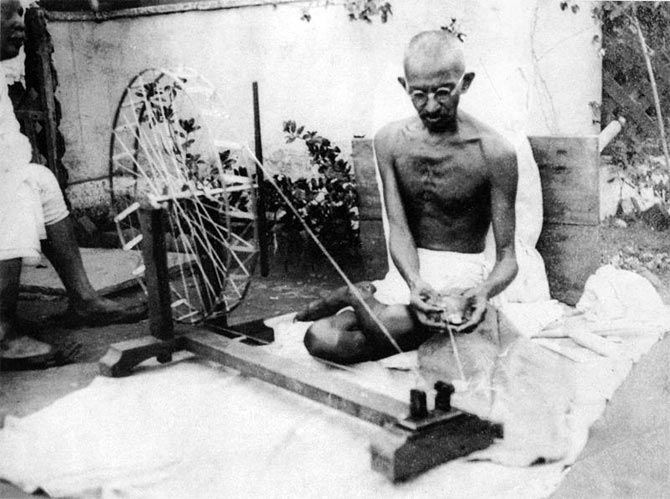
The arrest of almost all the prominent leaders left the Khilafat rudderless.
Besides Maulana Azad, five secretaries of the Khilafat committee were also arrested.
Common Muslims were left high and dry. Many were of the opinion that they should forsake Gandhi and his guidance and should continue opposing the British policies on their own.
Muhammad Marmaduke Pickthall, the famous translator of the Quran into English, while presiding over the CKC in Sindh advised the Muslims to desist from turning away from Gandhi.
He told the Khilafat committee volunteers that he was aware that some Muslims did not favour making a Hindu as their leader. Nonetheless, he emphasised, a saintly Hindu who cherished the ethical and sublime principles of life would prove a far better leader for the Muslims than a Muslim sinner who lived an ignoble life.
Excerpted from Khilafat In History And Indian Politics by Zaheer Ali, with the kind permission of the publishers, Aakar Books.









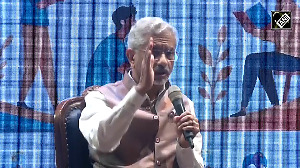


 © 2025
© 2025